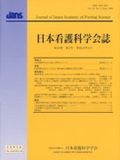Japanese
English
- 販売していません
- Abstract 文献概要
- 参考文献 Reference
- サイト内被引用 Cited by
要旨
本研究の目的は,回想を聴くことで高齢者の終末期の意思がどのような形で表出されていくのかに焦点を当て記述することである.研究参加者は,A特別養護老人ホームの5名の女性高齢者である.研究者は,研究参加者と1人当たり3回,回想を中心とした対話を行った.
対話記録を分析した結果,家族,特に“子ども”をキーワードに人生を回想する高齢者の姿が見えてきた.そして,それぞれのテーマで人生を回想した後,高齢者はごく自然に自分の人生の終わりについても語ることが明らかとなった.高齢者の語りからは,食べられなくなった時を死が近いサインとして,静かに受け止めようとしている姿がみえてきた.高齢者はまた,最期まで“ひと”とのつながりを求めていることが明らかとなった.
回想を中心とした対話それ自体に高齢者の存在を自他ともに認めるケアの側面があり,そこにはその高齢者なりの最期までの生き方の望みが表現され得ることが示された.
Abstract
The purpose of this study is to listen to and record the elderly's recollection of their life story focusing on how their desires in the last stage of their life are expressed. The participants in the research were five elderly women living in nursing home “A.” The researcher held three dialogues with each participant and recorded the conversations that centered on their life stories.
The analysis of the records revealed that when the elderly women recalled their lives “children” was a frequently used keyword. It was found that, after recalling their life, the elderly women would readily start discussing the end of their own lives. Listening to the life stories of the elderly women, the researcher learned that they consider the time when they will no longer be able to eat as the sign that they will soon die, and they were trying to accept the fact calmly. This research also shows that the elderly desire to maintain personal relationships with others till the end of their lives. Therefore, during terminal care the elderly should be kept in contact with others and not be allowed to feel isolated.
Conversation centering on listening to the elderly's life story contains an aspect of care in that the existence of the elderly person is affirmed by themselves as well as by those who surround them, and it allows the elderly to express how they would like to live the last years of their life.
Copyright © 2008, Japan Academy of Nursing Science. All rights reserved.


